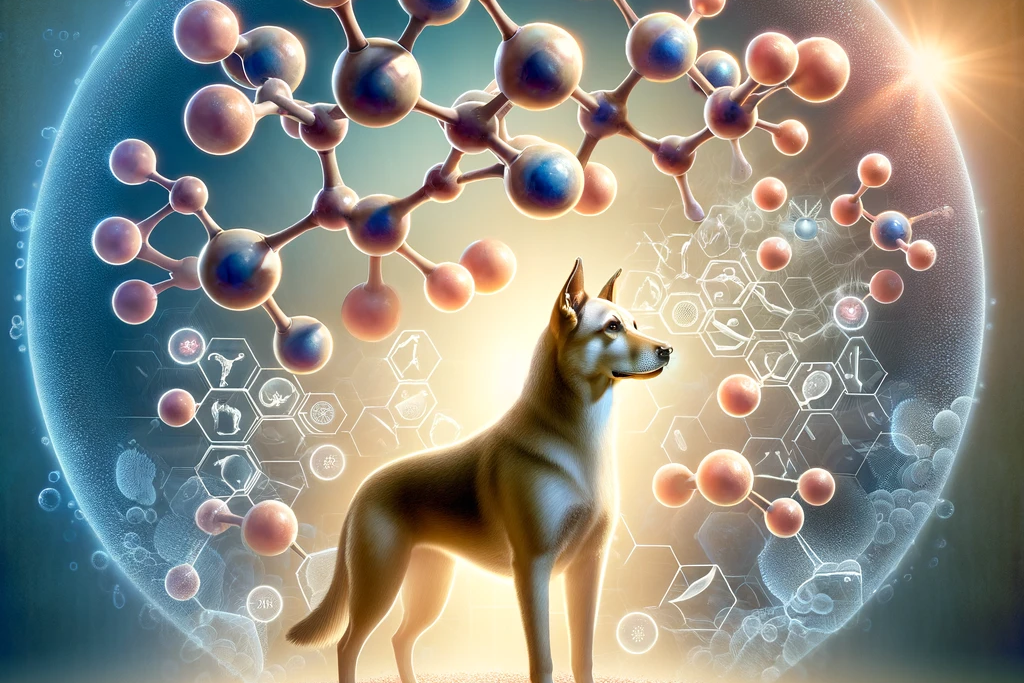Ferritin

In the world of animal health, there are numerous markers that can provide information about the wellbeing of our four-legged friends. One of these markers, which plays a central role in the diagnosis and monitoring of various conditions, is ferritin. This protein is more than just a simple indicator; it is a crucial factor in canine iron metabolism. In this article, we explore the world of ferritin, explain its function and importance, and highlight the pros and cons of its concentration in our dogs' bodies.
What is ferritin?
Ferritin is a protein found in the body of dogs (and humans) that serves as the main storage site for iron. It binds iron in a form that is safe and accessible to the body when it is needed. The concentration of ferritin in the blood is a reflection of iron levels in the body, making ferritin an important indicator of iron status.
Benefits of ferritin monitoring
- Early detection of iron deficiency: A low ferritin concentration can be an early sign of iron deficiency, even before symptoms such as anemia become visible. Timely diagnosis and treatment can prevent serious health problems.
- Monitoring inflammation and infection: Ferritin is an acute-phase protein whose levels can rise during inflammation or infection. Elevated ferritin levels can therefore indicate underlying inflammatory processes or infections.
- Diagnosis and management of iron overload: Not only iron deficiency, but also iron overload can be detrimental to a dog's health. High ferritin levels can indicate possible iron overload, which must be treated to prevent organ damage.
Disadvantages and risks
- Non-specific results: While elevated ferritin levels may indicate inflammation or iron overload, they are not specific enough to determine the exact cause. Further investigations are often necessary to identify the underlying cause.
- Cost and accessibility: Monitoring ferritin levels can be costly and may not be easily accessible everywhere. This can be particularly challenging for pet owners in rural areas or with limited financial resources.
- Stress for the animal: Taking blood samples to monitor ferritin levels can be stressful for some animals, which should be taken into account when deciding on regular testing.
Ferritin plays an essential role in the iron metabolism of our dogs and provides valuable insights into their health status. Monitoring ferritin levels can be crucial for the early detection of iron deficiency or overload as well as inflammatory processes and infections. Despite the challenges that can be associated with monitoring, the importance of ferritin in veterinary practice is undeniable. Responsible pet owners should work closely with their veterinarian to decide whether and how often it makes sense to check their dog's ferritin levels. Ultimately, the goal is always to ensure the best possible care and a long, healthy life for our four-legged family members.
If you notice any signs of hypersensitivity or poisoning in your dog, you should see your vet immediately. We are not a substitute for a vet, but we try to be as accurate as possible. Every dog reacts differently and we recommend you get a second opinion or consult your vet if in doubt.
Stay healthy and take good care of your four-legged friend!😊
Similar to Ferritin
Transferrin is a glycoprotein produced in the liver that plays a critical role in the transport of iron through the bloodstream to various cells and tissues of the body. Iron is an essential element...
Hemoglobin is a protein found in red blood cells. It consists of four subunits, each of which contains an iron atom. This iron atom can bind oxygen and release it again. This enables haemoglobin to...
Myoglobin is a protein found in the muscle cells of almost all vertebrates, including dogs. It has the important task of storing oxygen and delivering it to the muscle cells, especially during...
Lactoferrin is a glycoprotein that plays an important role in the immune system. It is best known for binding and transporting iron, but its functions go far beyond that. Lactoferrin has...



